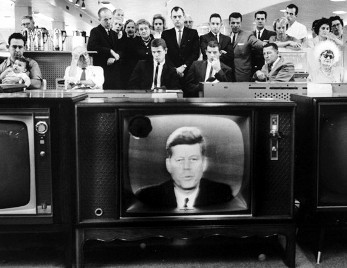Fifty years ago, I came to Mr. Freeman’s freshman Algebra class struggling to understand little x’s and y’s. The Cuban Missile Crisis came into all of our living rooms at a time when the term “Special Bulletin” meant something more significant than “Breaking News.”

For thirteen days, two nations stood on the verge of nuclear war and while I was aware of how critical the stakes were, somehow, I had a blind faith that the leaders of both “super powers” would come to their senses and resolve the issue. I wish I had that kind of faith in political leadership today.
David Krieger is founder and President of the Nuclear Age Peace Foundation. Since 1982, David and his group have worked tirelessly for the complete elimination of all nuclear weapons. A daunting task. David is like the Dalai Lama of the anti-nuclear movement. I have never known a more spiritually committed human being who goes about his task with a calm certitude in the rightness of his actions, not for himself, but for all of us on this planet.
David’s recent essay, “Reflections on the Cuban Missile Crisis at Fifty,” is a timely reminder that the moral imperative is still before us.
Fifty years ago this month, the world teetered on the precipice of a nuclear war between the U.S. and Soviet Union during the 13-day Cuban Missile Crisis. We were fortunate to have survived that crisis, thanks largely to the restraint shown by President Kennedy and Premier Khrushchev.
Now, fifty years later, there is no immediate crisis such as that in 1962 over Soviet nuclear-armed missiles being placed in Cuba. There are, however, still some 19,000 nuclear weapons in the arsenals of nine nuclear-armed nations: the U.S., Russia, U.K., France, China, Israel, India, Pakistan and North Korea. Approximately 95 percent of these weapons are in the arsenals of the U.S. and Russia. Some 2,000 of them are kept in a state of high alert, ready to be immediately launched upon an order to do so at any moment of any day or night.
Although the Cold War ended more than 20 years ago, the possibilities for crisis are still with us. NATO has expanded to the Russian borders, despite U.S. promises not to do so, and has begun placing missile defense installations near the Russian borders.
Despite U.S. and NATO assurances to Russia that these installations are to protect against an Iranian missile launch, Russian leaders view these installations as undermining their strategic deterrent force by making them vulnerable to a first-strike attack. They have said that they will target these U.S. missile defense installations.
In another U.S.-Russian confrontation over Georgia, such as occurred in 2008, or some other regional dispute, it is possible that tensions could rise to the point of nuclear crisis between U.S. and Russian military forces. Of course, this would be crazy, but it is far from impossible. What would make the world safer? What might we expect from national leaders who should have learned from how close the world came to nuclear catastrophe during the Cuban Missile Crisis?
First, for the U.S. and NATO to make Russia a partner in any missile defense plans focused on Iranian missiles. Second, for the U.S. to remove its approximately 180 remaining tactical nuclear weapons located in five European countries (Belgium, Germany, Italy, the Netherlands and Turkey). Third, for the U.S. and Russia to take seriously their legal obligations under the Non-Proliferation Treaty to pursue negotiations in good faith for an end to the nuclear arms race at an early date, for nuclear disarmament in all its aspects and for a treaty on general and complete disarmament.
We know now that a regional nuclear war would have global consequences. Atmospheric scientists have modeled a nuclear exchange between India and Pakistan in which each side used 50 Hiroshima-size nuclear weapons on the other side’s cities. Such a war would put enough soot from burning cities into the upper stratosphere to reduce warming sunlight for a decade, lowering surface temperatures on earth to the lowest levels in 1,000 years. This would result in shortened growing seasons, crop failures and famine that would kill hundreds of millions of people, perhaps a billion, throughout the world.
The scientific modeling showed that there would be a Nuclear Famine, and it would be triggered by using less than half of one percent of the world’s nuclear explosive power. Such a famine could be initiated not only by India and Pakistan, two countries that have been to war over Kashmir on several occasions, but by any of the Nuclear Nine. The U.S. and Russia could each trigger a far more devastating Nuclear Famine by a nuclear attack on the other side’s cities, an attack which would be suicidal even if the other side did not respond in kind.
When thinking about nuclear weapons and their dangers, we would do well to remember the words of General George Lee Butler, former commander-in-chief of the United States Strategic Command, responsible for all U.S. strategic nuclear weapons: “Nuclear weapons give no quarter. Their effects transcend time and space, poisoning the Earth and deforming its inhabitants for generation upon generation. They leave us wholly without defense, expunge all hope for survival. They hold in their sway not just the fate of nations but of civilization.”
Nuclear weapons do not protect us. Rather, they make us vulnerable to annihilation. It is relatively easy to put them out of our minds, but to do so is to evade our responsibility as citizens of the world and of nuclear-armed countries. Nuclear weapons imperil our common future – they imperil our children and their children and all children of the future. They imperil all we hold dear. We must speak out for a world without nuclear weapons. It is a moral and legal imperative and we would be well advised to act now before we are confronted with the equivalent of another Cuban Missile Crisis.
Comments










